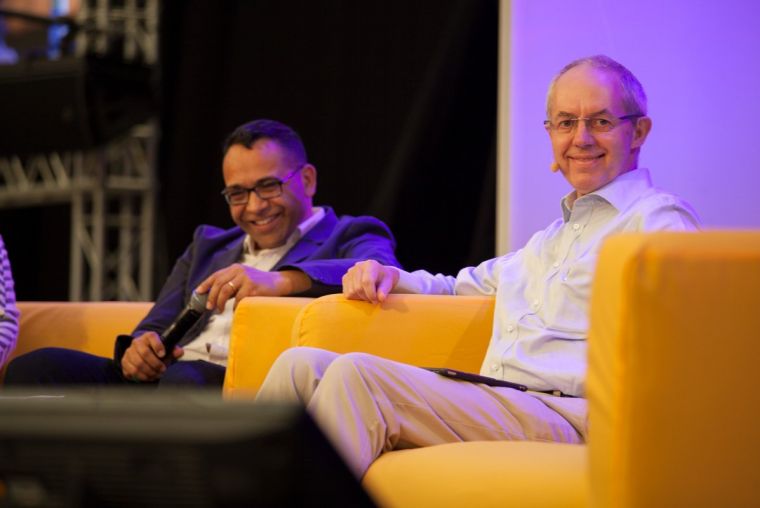Justin Welby asks: How do we learn to see God in the face of the stranger?
The Archbishop of Canterbury, Justin Welby, has written a foreword to 'God is Stranger', by Christian Today contributing editor Krish Kandiah, from which this extract is taken.

Where is God? This is probably the question I, like many other Christian leaders, get asked most often. The question comes in many different guises. Why does God allow evil and suffering? Where was God when I lost my job? Why do children die? Why doesn't God intervene? One cannot watch the daily news without wondering, 'How does the idea of a God of love fit with the reality of the world we live in?'
The question, of course, is not a new one. Human beings have been asking for centuries. The Psalms are filled with the same question. Story after story in the Hebrew Bible reveals characters struggling to see God, meet with God, or work out how to be partners with God in the world. Even Jesus cries out, 'My God, my God, why have you forsaken me?'
***
A journey through Scripture, from the leafy shores of Eden, through the deserts of Mesopotamia, to the road to Emmaus, reveals a God who always comes in unexpected places and at unexpected times. This is the story of a God who shows himself in the faces of strangers and those who are dismissed by others as most ungodly. God shows himself, most often, to be a God of small things, small people and small places. He comes in disguise, without fanfares and trumpets. He chooses a small nation in a forgotten corner of the world, bordered by powerful empires, and works slowly, patiently with its people. With Abraham the wanderer. With refugees fleeing from Egypt, desperately looking for safety. With the nascent nation of Israel, struggling to keep hold of the promises of the past and to build a present that reflects justice, peace and righteousness. With a young mother in Galilee, forced to flee into Egypt, away from Herod's wrath, bringing the story full circle.
Even a quick flick through the Bible reveals a story of endless wanderings. The 'God of Abraham, Isaac and Jacob' is a God of wanderers, of aliens and refugees. The God of the displaced. The God of those who just do not belong. The God whose people, and presence, is in 'all the wrong places'.
All too often, when we ask, 'Where is God?' it is because we want a God of power: a God who will come and sort the world out, overriding human selfishness and injustice, putting things right from above. Instead, we discover a God who chooses to come quietly and dwell with the poor and the oppressed, the refugee and the alien. This is a strange God who chooses not to act from far away, but to meet his people, listen to them, journey with them, working for justice by transforming us as we meet him in unexpected places.
Where are we expecting to meet God? Where are we looking and what kind of God are we looking for? Are we looking for a God made in our own image, or are we prepared to look for a God who is...stranger? And what does this realisation of God's strangeness mean for us as we relate to those who surround us?
... If God is stranger, then being hospitable to God inevitably leads us into unexpected, uncomfortable and stretching places. If God is a God of the aliens and refugees, then how do we respond to the crises of our time? In a world marked by fear of difference and a return to isolationism, where the desire to protect a country's wealth fights against humanitarian concerns, what does Christian hospitality look like? And, more importantly, how do we truly learn to see God in the face of the stranger?
Hospitality has long been a mark of the Christian life. It is a cornerstone of the rule of St Benedict, and we see extraordinary examples in the world today. The churches of Lebanon, for instance, over the last five years, have been living out costly hospitality. Not just safe dinner parties for a new family coming into church; not just signing a cheque in support of a charity; but a real, costly, on-the-ground sharing of life and resources with those who have lost everything. This hospitality weeps with those who weep, forgets self-interest and barriers of race or religion, and reaches out to those who have just managed to escape, but cannot go any further.
There is something deeply moving at the thought of God's presence in the refugee camps. The Gospel of John tells us that 'the Word ... made his dwelling among us' (John 1:14). Or, more accurately from the Greek, 'God tabernacled', or 'pitched his tent among us'. God made himself a stranger, a refugee, unloved, unknown, unrecognised and unwelcome. And it is only when we dare look beyond the safe spaces of our lives that we can catch a glimpse of this risk-taking God, who chooses to walk with us rather than sorting out human affairs from the safety of heaven. But beware: when you catch a glimpse of this God, there is no return. Life cannot be the same. As we come closer to a stranger God, we ourselves become stranger too – drawn into the life and work of God in the world.
Dr Krish Kandiah is the founding director of Home for Good. 'God is Stranger' is published by Hodder, price £13.99.











